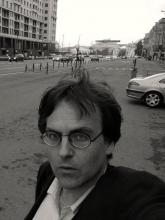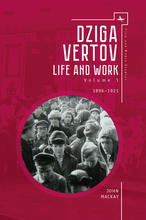John MacKay, Director of Graduate Studies
Biography
John MacKay is Professor of Film and Media Studies and Professor and Chair of Slavic Languages and Literatures and at Yale University, New Haven, Connecticut, USA. He completed a BA in English at the University of British Columbia in 1987, and a PhD in Comparative Literature at Yale in 1998. He teaches a wide variety of courses on literature, Russian culture, cultural theory, and film and moving image media. His current research interests include documentary and experimental film, early Soviet culture and its later reception, Marxist theory, the comparative and cross-linguistic study of film and media concepts, and the comparative study of the short story form.
Research Interests
Current research interests include documentary and experimental film, early Soviet culture and its later reception, Marxist theory, the comparative and cross-linguistic study of film and media concepts, and the comparative study of the short story form.
Education History
BA, English, University of British Columbia, 1987
Pushkin Russian Language Institute (certificate in Russian), 1989
Ph.D. in Comparative Literature, Yale University, 1988


